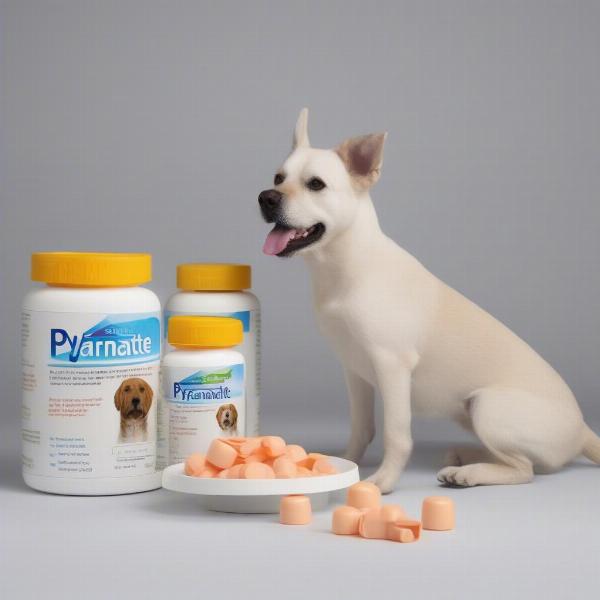Pyrantel pamoate is a common dewormer used for dogs to treat certain types of intestinal parasites. Understanding the correct pyrantel pamoate dosage for dogs is crucial for effectively eliminating these parasites while ensuring your dog’s safety. This comprehensive guide will cover everything you need to know about pyrantel pamoate for dogs, from dosage guidelines to potential side effects.
Understanding Pyrantel Pamoate for Dogs
Pyrantel pamoate works by paralyzing specific intestinal worms, allowing them to be expelled from your dog’s digestive system. It is effective against roundworms and hookworms, two common parasites that can cause a variety of health issues in dogs. However, it’s important to note that pyrantel pamoate is not effective against all types of worms, such as tapeworms or whipworms. Therefore, a proper diagnosis by a veterinarian is essential to determine the correct deworming medication for your dog.
Pyrantel Pamoate Dosage for Dogs: How Much to Give?
The dosage of pyrantel pamoate for dogs is generally based on weight. A common recommendation is 5 mg of pyrantel base per kg of body weight. However, it’s crucial to always follow the instructions provided by your veterinarian or on the product label. Different formulations of pyrantel pamoate may have varying concentrations, so using the correct dosage is essential to avoid under- or overdosing your dog. Never guess the dosage – always consult a professional.
Administering Pyrantel Pamoate to Your Dog
Pyrantel pamoate is available in various forms, including tablets, capsules, liquids, and chewable tablets. The method of administration will depend on the form you choose. Tablets and capsules can be given directly or hidden in food. Liquid formulations can be mixed with food or administered using a syringe. Chewable tablets, often flavored to make them more palatable, can be given as a treat. Regardless of the form, always ensure your dog consumes the entire dose.
 Giving a Dog Pyrantel Pamoate
Giving a Dog Pyrantel Pamoate
Potential Side Effects of Pyrantel Pamoate in Dogs
Pyrantel pamoate is generally considered safe for dogs when administered at the correct dosage. However, some dogs may experience mild side effects, such as vomiting, diarrhea, loss of appetite, or lethargy. If you notice any unusual symptoms after administering pyrantel pamoate, consult your veterinarian immediately. In rare cases, more severe allergic reactions can occur.
When to Deworm Your Dog with Pyrantel Pamoate
The frequency of deworming will depend on your dog’s age, lifestyle, and risk of exposure to parasites. Puppies are often dewormed multiple times during their first few months of life. Adult dogs may require deworming every few months or annually, depending on their risk factors. Your veterinarian can recommend a suitable deworming schedule for your dog.
Conclusion
Pyrantel pamoate can be a valuable tool in protecting your dog’s health by effectively treating roundworms and hookworms. However, using the correct pyrantel pamoate dosage for dogs is paramount. Always consult your veterinarian for a proper diagnosis and to determine the appropriate dosage and deworming schedule for your dog. Following these guidelines will ensure your dog receives the necessary treatment while minimizing the risk of any potential side effects.
FAQ
- How long does it take for pyrantel pamoate to work in dogs? Pyrantel pamoate typically starts working within a few hours.
- Can I give my dog pyrantel pamoate if I suspect they have worms? No, always consult your veterinarian before administering any medication to your dog.
- What should I do if my dog vomits after taking pyrantel pamoate? Contact your veterinarian for advice.
- Is pyrantel pamoate safe for pregnant dogs? Consult your veterinarian to determine the safety of using pyrantel pamoate during pregnancy.
- Can I buy pyrantel pamoate over the counter? While some formulations are available over the counter, it’s always best to consult with your vet before administering any medication.
- What are the signs of worms in dogs? Signs can include vomiting, diarrhea, weight loss, a pot-bellied appearance, and scooting.
- How often should I deworm my dog? This depends on your dog’s individual risk factors. Consult your veterinarian for a personalized recommendation.
ILM Dog is a leading international online resource dedicated to providing expert advice and information on all aspects of dog care and wellbeing. From breed selection and health care to training and nutrition, we offer a comprehensive range of resources for dog owners worldwide. For personalized guidance and support, contact us at [email protected] or +44 20-3965-8624. ILM Dog is committed to helping you provide the best possible care for your canine companion.